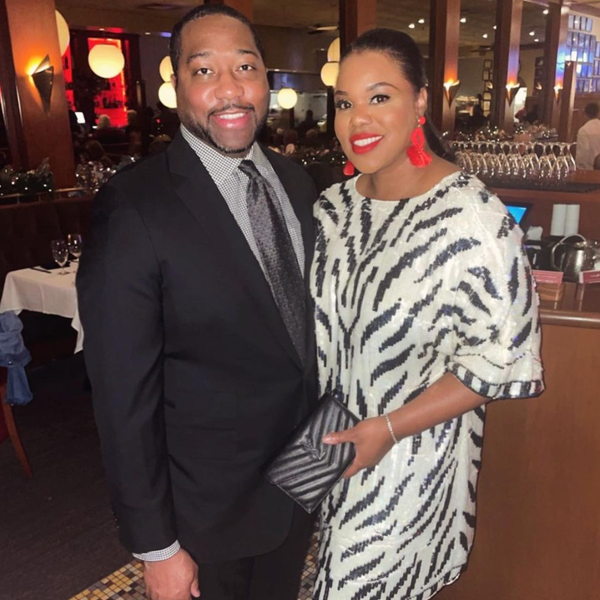
3 Streaming Love Stories To Warm Your Cold, Dead Heart
If you let Twitter tell it, chivalry is dead. Every other day, we see some unfortunate men with microphones and internet connections talk about women needing to "humble themselves" and "submit". They want you to meet them at the Popeye's parking lot and watch them eat a two-piece while you sit there hungry and call it a "date." Bring back shame! Bring back romance! Bring back begging on your knees for women's hearts in R&B!
READ MORE: BLACK WOMEN, WE DESERVE MORE
But even if we can't be like Mary J. and Glorilla and declare ourselves FNF in real life, fear not: the streaming world is chock full of romantic stories that will warm your cold, dead heart, and remind you that love is real, and it's all around us. Here are three love stories to stream right now.
Mr. Malcolm's List

Zawe Ashton as Julia in Mr. Malcolm's List
I admit, I had given up on the onscreen regency-era romance genre. As casting for these projects has become more inclusive of the many Black people who were in Britain during the era, a la Bridgerton, I've noticed that even as Black men get to be love interests, Black women barely exist, let alone get to be the lead or have the romance. (Dark-skinned Black women are particularly absent from the onscreen regency era romance, Shonda Rhimes' criminally underrated 2017 ABC series Still Star-Crossed starring Lashanna Lynch being an exception.) And to even desire to be a Black person of nobility at that time, one would have to be at least complicit in the atrocities of imperialism and a likely beneficiary of the spoils of trafficking Africans. So, I'd moved on from the genre as "not for me."
Then I set all that aside and enjoyed the hell out of Mr. Malcolm's List. With a story so sweet and romantic, it reminded me of why I fell in love with the genre in the first place.
Sope Dirisu is swoon-worthy in the starring role of Mr. Jeremy Malcolm, the wealthy, eligible bachelor with a 10-point list of requirements for a wife. Zawe Ashton is deliciously devious as the scorned Julia Thistlewaite who vows revenge against Mr. Malcolm, but winds up on a path to true love that she never expected. Even as his Malcolm's Mr. Darcy-like arrogance leads to a well-deserved humbling, you will absolutely melt when the real reason for the film's title is revealed at the end.
Mr. Malcolm's List is streaming on Prime Video Now
From Scratch

Zoe Saldana in From Scratch
Netflix
From the true story of author and TV writer Tembi Locke and adapted into a limited series for Netflix with her sister Attica Locke as showrunner, From Scratch is the kind of love story you watch if you need to unplug your tear-ducts. Starring Zoe Saldana as Amy (a version of Tembi), From Scratch follows a young woman who has dropped out of law school and moved to Italy to pursue her passion of painting. In Florence, she not only discovers she's a very good artist, she also meets Lino (Eugenion Mastrandrea) a very hot Italian chef who sweeps her off her feet.
Just when it seems that the biggest obstacles they'll have to face on their road to happily ever after would be their racial and ethnic differences and their families' disapproval, Amy and Lino face their worst opponent yet: time. In From Scratch, we see how real love can stretch people and empower them to be the best versions of themselves--all while improving the lives of people around them. Danielle Deadwyler turns in another stunning supporting role as Amy's sister Zora (a fictionalized Attica) and this love story shows the bonds and depths of sisterhood in times of joy and grief.
This is no fairytale, but this based-on-a-true-story love is definitely one for the ages. Bring all of your tissues and settle in for a heartbreaker of a binge.
From Scratch is streaming now on Netflix.
Anything's Possible

Anything's Possible
Prime Video
This YA rom-com is unlike anything we've seen so far. Starring Eva Reign and Abubakr Ali, this love story follows trans teen Kelsa (Reign) as she falls in love with her art classmate and fellow dreamer Khal (Ali). On top of the consistent pressures of high school and the looming fear of college and the future, Kelsa and Khal navigate transphobia from their friends and classmates and find love and self-acceptance.
Directed by Billy Porter in his debut as an auteur, Anything's Possible will have you laughing and crying at this very sweet young romance. Though not every love story is meant to last forever, Anything's Possible shows how a beautiful first love can shape the way you experience love and life well into the future.
Anything's Possible is streaming now on Prime Video.
Let’s make things inbox official! Sign up for the xoNecole newsletter for daily love, wellness, career, and exclusive content delivered straight to your inbox.
How This New Bond Repair Line Transformed One Mother's Postpartum Shedding Into The Ultimate Curl Comeback
This article is in partnership with SheaMoisture
For Crystal Obasanya, her wash day woes came shortly after her son did. The beauty and lifestyle content creator had been natural for years, but during postpartum, she quickly learned about one reality many mothers can relate to experiencing: postpartum hair loss. “Sis had thinning hair. Sis had split ends,” she shared about her hair changes in a Reel via xoNecole.
Over a year into her postpartum journey, Crystal explained she also had dry, brittle hair, noting that keeping it hydrated before pregnancy had already been “a task.” The 4C natural recalled going from thick hair during pregnancy to a thin hairline due to postpartum shedding as “devastating.” When it came to strengthening and revitalizing her hair, the new SheaMoisture Bond Repair Collection was just the thing she needed to elevate her damaged coils to revive and thrive status and get them poppin' again.
SheaMoisture is providing us with the cheat code for transforming dry and damaged strands into thriving and deeply nourished crowns. By unveiling their 4-step hair system, the SheaMoisture Bond Repair Collection is equipping you with the tools to reverse signs of hair damage caused by protective styling, heat, and color and is uniquely formulated for Type 3 and 4 hair textures.
The haircare system revives damaged natural hair by repairing and rebuilding broken hair bonds through a game-changing combination of HydroPlex Technology and AminoBlend Complex, a unique blend of fortifying amino acids formulated specifically for curly and coily hair. Scientifically proven to reduce breakage by 84% and make your hair six times stronger (vs. non-conditioning shampoo), the collection infuses your hair with the nourishment it craves and the strength it deserves.
All five products of the SheaMoisture Bond Collection are infused with natural strengthening ingredients like Amla Oil and fair-trade shea butter. The collection consists of the 4-step breakage-fighting Bond Repair system, as well as the Bonding Oil.
“When trying it out, I quickly noticed that my hair felt revived and renewed, and my curls were so hydrated,” Crystal said while using the Amla-infused Bond Repair Leave-In Conditioner. “I also felt my hair strands were stronger.” So much so that the influencer felt brave enough to get her hair braided shortly thereafter. “I can definitely say that I will be keeping it in my hair wash routine,” she added in the caption of her Reel about her positive experience using the products.
SheaMoisture Bond Repair Collection is making bond-building a key player in your wash day routines and the purveyor of life for thirsty manes. Because who doesn't want stronger, shinier, happier hair?
Step One: Bond Repair Collection Shampoo
Rejuvenate your hair with SheaMoisture Bond Repair Shampoo, your go-to solution for luscious locks. Packed with hella hydration power, this shampoo adds moisture by 60% while removing buildup without stripping your strands. This shampoo gently cleanses impurities while significantly enhancing shine, smoothness, and softness.
The Bond Repair Collection Shampoo is the first step in the 4-step Bond Repair system, all of which are powered by the uniquely formulated AminoBlend, and HydroPlex, SheaMoisture’s technology that rebuilds hair strength at its core.
Step Two: Bond Repair Collection Conditioner
Tailored to repair styling damage, this creamy conditioner locks in 12x more moisture than standard non-conditioning shampoos, boosting damaged hair strength by 1.5x with significantly less breakage. The creamy SheaMoisture Bond Repair Collection Conditioner deeply hydrates, enhances manageability, and leaves your hair looking healthier and shinier.
Step Three: Bond Repair Collection Masque
This Ultra Moisturizing reparative masque is a moisture-rich game-changer for those dealing with the aftermath of hair damage caused by styling. The SheaMoisture Bond Repair Collection Masque delivers 13 times more moisture compared to non-conditioning shampoos, ensuring your hair feels nourished and soft. Designed to repair and rejuvenate, this masque significantly strengthens damaged hair — making it twice as strong while reducing breakage.
Step Four: Bond Repair Collection Leave-In Conditioner
Elevate your curl game with SheaMoisture’s Bond Repair Collection Leave-In Conditioner. Lightweight and hydrating, the Bond Repair Leave-In Conditioner provides 12x more moisture than non-conditioning shampoos and tames frizz with 24-hour humidity control. Designed to define curls and coils, the leave-in conditioner enhances softness and shine allowing you to detangle effortlessly.
Bonding Oil
The SheaMoisture Bond Repair Collection Bonding Oil is a multitasking all-in-one formula that acts as a heat protectant and provides the hair with moisture, strength, shine, damage protection, and intense nourishment. This lightweight oil not only offers 24-hour frizz and humidity control but also fortifies your tresses, making them up to 5 times stronger with significantly less breakage.
Featured image courtesy
In today’s economy, we’re always looking for ways to stretch every dollar. However, the allure of new gadgets, trendy clothes, and the latest dining spots can often lead to impulsive spending. An iced latte here and an Uber Eats delivery there, topped off by a spontaneous online order can add up over time.
For those seeking to curb frivolous expenses and adopt a more mindful approach to their finances, participating in a no-spend month could be the solution to gaining control over their spending.
What is the No-Spend Challenge?
The no-spend challenge is a personal finance exercise where individuals commit to not spending money on non-essential items for a specific period. This could mean cutting off a subscription service, limiting your nights out for drinks, pulling back on online shopping, and holding off on big, spontaneous purchases to see how much you’d save over the month. The challenge encourages participants to evaluate their spending habits, identify areas of unnecessary expenditure, and redirect their financial focus toward savings and debt reduction.
This spending requires one to differentiate between needs and wants, with the base necessities being food, transportation, housing, essential bills, and medical/mental health expenses.
Preparing for a No-Spend Challenge
When embarking on a no-spend month, proper preparation is key to ensure you make the most out of the experience.
Financial expert and founder of The Frugal Feminista, Kara Stephens, says that having a compelling “why” can serve as a motivator to endure the ups and downs of the challenge, especially if it's your first time. “Have a clear idea of what your goals and outcomes are for the challenge. Do you want to be grateful for what you have? Do you want to save a certain amount of money?” she tells xoNecole. “Know what's going to be your ‘after-no-spend challenge' sustainability plan because we're hoping that your habits and your perspective on spending are changing and that you find a way to make that a part of your life after the challenge.”
One of the initial catalysts for the recent popularity of the no-spend challenge is to combat “revenge spending.” This spending habit, triggered by the “life is short” reality of the pandemic, has caused many of us to want to make up for lost time or missed experiences, which can lead to reckless financial decisions and jeopardize future stability.
Because of this, Stephen advises us to reframe our thinking around revenge spending to avoid putting our financial future at risk.
“Try and shift your perspective on revenge spending and say, yes, I want to live my best life, but how can I spend it responsibly?” she says. “How can I revenge spend on a budget? How can I remove the idea of revenge spending from my lexicon and just live well and plan systematically so it doesn't take away from my future financial goals?”
Benefits of A No-Spend Month
Taking part in a no-spend month has a number of benefits, one of which is the self-awareness and gratitude you gain by cutting out non-essential purchases. “You’re more financially self-aware because you're only thinking about what you deem as essentials,” Stephens says. “It can also make you more resourceful because you have to use what you have in your home, rather than going out and shopping.”
Those who take part in the challenge often find they become more intentional with their purchases, distinguishing between what they truly need and what they can do without. The money saved over this course of time can then be redirected towards paying off debt, building an emergency fund, or being put into a sinking fund.
Due to the rigid nature of the challenge, Stephens says that it’s important to have a sustainable framework to follow the no-spend challenge to avoid reverting to old habits. “It can be like "yo-yo dieting,” she explains. “If you were very strict for a certain period, but didn’t create any type of habit or change of mind to continue with it, you could resort back to revenge spending, ironically.”
Things to Keep In Mind
While it may seem like just another financial trend, taking part in a no-spend month can provide precious data about not just how much money you spend but also your mindset and relationship around money. You can observe how your feelings about money change and highlight areas of improvement. Alternatively, you can even start a sinking fund that allows you to put money aside for large purchases or personal experiences.
Ultimately, it’s not that spending money is bad, it’s about how you approach spending in a responsible way that ensures your financial security and success in the long run.
Let’s make things inbox official! Sign up for the xoNecole newsletter for love, wellness, career, and exclusive content delivered straight to your inbox.
Featured image by Evgeniia Siiankovskaia/Getty Images









